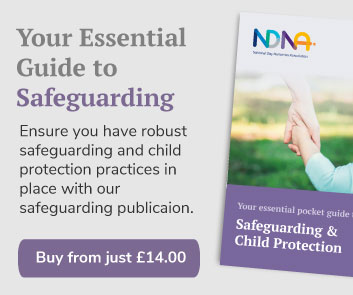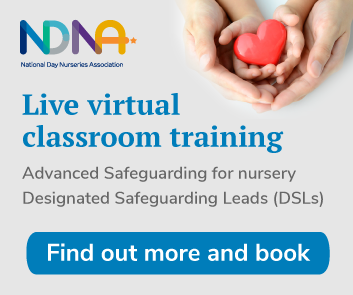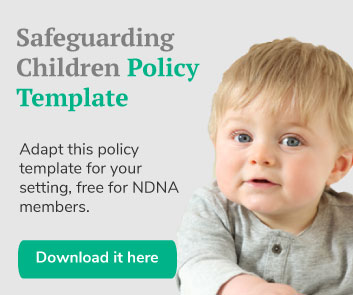Discover everything you need to know about how to safeguard a child at nursery here
- What is safeguarding and child protection at nursery?
- How can I safeguard and protect the children in my care at nursery?
- Key questions you could ask to determine staff knowledge
- Safeguarding partners
- Disclosure and Barring Service Checks
- Frequently asked questions
- How often do my team need to attend child protection training?
What is safeguarding and child protection?
Safeguarding refers to the actions you take to keep children safe from harm, this includes, adhering to staff:child ratios, health and safety risk assessments and site security.
Child protection refers to the activity that is undertaken to protect specific children who are suffering, or are at risk of suffering, significant harm and is an integral part of safeguarding children and promoting their overall welfare.
Every practitioner working with children in a nursery is responsible for keeping children safe from harm.
Practitioners work closely with children and families and get to know them well, this enables practitioners to be alert to changes in behaviour and to identify and report any concerns they may have.
Keeping Children Safe in Education (KCSIE) changed on 1 September. See the key changes here.
‘Working together to safeguard children’ 2018 sets out how organisations and individuals should work together to safeguard and promote the welfare of children and young people.
Key tips for keeping children safe in nursery
- Ensure that practitioners are supported and confident to implement the settings safeguarding policy and procedures
- Use safeguarding scenarios to check staff knowledge and understanding of identifying signs and symptoms of abuse and what to do if they have a concern
- Use safeguarding quizzes to test staff knowledge and understanding
- Use inductions to provide a strong safeguarding framework for new staff to understand your approach to safeguarding and their own responsibilities within this framework
- Complete staff suitability checks and references prior to new staff starting work to ensure staff suitability to work with children
- Ensure safeguarding is a permanent agenda item at every staff meeting, to highlight its importance across all areas of your practice
- Follow statutory guidelines for safeguarding training for all staff
- Create a child centred approach by considering, at all times, what is in the best interests of the child
Keep abreast of updates and insights from your local safeguarding teams or local authority safeguarding officer.
How can I ensure the children in my care at nursery are protected and safe?
- You must train all staff to understand their safeguarding policy and procedures – some of the most important in the nursery
- Your team must know exactly what to do in any given situation where a child’s safety and welfare may be at risk
- Inductions must include information on safeguarding and child protection – ensure staff level of understanding and competence in these areas is appropriate for their role
- Consider making safeguarding a permanent addition to every staff meeting e.g using our safeguarding scenarios to help your staff to put your procedure into practice
- Assess safeguarding understanding and knowledge of each of your team members in supervisions
- Supervisions provide opportunities for each team member to discuss any issues relating to the child’s well-being, which enables you to check their understanding of what they should be concerned about and what they need to do if they have concerns.
Download our safeguarding policy and procedure template – free to NDNA members. Join NDNA here to access this.
Key questions you could ask to determine staff knowledge:
- What signs would concern you that a child was being neglected, mistreated or abused?
- What would you do if you had concerns about a child’s welfare?
- What would you do if you suspected a child was being neglected, mistreated or abused at home?
- If the designated safeguarding person was not available, who would you talk to?
- If you had concerns that a member of the team was acting inappropriately with the children in their care, what would you do? Who would you tell?
- What would you do if the person you suspected of abuse was the person in charge during that day?
It is essential that you, as the manager, and your Designated Safeguarding Lead have an up-to-date knowledge of safeguarding issues.
You must use this knowledge and experience to make sure that your whole team is kept up-to-date with any changes to not only your internal procedures, but also local and national developments.
Safeguarding Partners
A safeguarding partner in relation to a local authority area in England is defined under the Children Act 2004 (as amended by the Children and Social Work Act, 2017) as:
- The local authority
- A clinical commissioning group for an area any part of which falls within the local authority area
- The chief officer of police for an area any part of which falls within the local authority area.
The three safeguarding partners should agree on ways to co-ordinate their safeguarding services; act as a strategic leadership group in supporting and engaging others; and implement local and national learning including from serious child safeguarding incidents.
Taken from page 72 of Working together to safeguard children 2018.
Disclosure and Barring Service Checks (DBS Checks)
DBS checks (or Disclosure Scotland for Scotland) enable employers to see if potential employees or volunteers have been convicted of anything in the past that affects their suitability to work with children.
NDNA members get access to discounted DBS Checks with uCheck.
Frequently asked questions
How often do my team need to attend child protection training?
All staff must have access to information on safeguarding and child protection which may include child protection training as appropriate for their role.
Your training should be updated every two years to ensure you keep your knowledge refreshed and keeping your knowledge up to date throughout the two years.
Your designated lead for safeguarding should be updating their knowledge on a continuous basis.
Designated leads can sign up for alerts from your local authority, national bodies such as NSPCC and membership organisations such as NDNA to enable them to be able to support the team effectively.
They should also refresh their advanced level training every two years.
How can I feel confident that all my team will respond to signs or symptoms of abuse quickly and appropriately?
As a manager you need to have a variety of different techniques and procedures in place to make sure that you know your team’s strengths and areas for development, including within safeguarding.
It is of course difficult to know exactly what everyone will do when faced with a potential case of abuse. But if you provide the support, training and have regular contact with your team, you are more likely to know where team members need further support and training.
You can then understand whether they are able to follow the appropriate procedures when required.
Talk to your team members on a regular basis about safeguarding.
Ask them key questions (as mentioned earlier) to test their knowledge and give them the confidence and knowledge to refer any concerns to you or the designated lead for safeguarding.
Useful Links
General
Department for Education – Child protection guide withdrawn
Keeping children safe in education
SEND
Safeguarding deaf and disabled children
Podcasts:
NSPCC Learning has launched the first in a series of podcasts covering child protection issues.
Safer Working Practices
Guidance for Safer Working Practices – non-statutory, but useful as a good starting point for a staff behaviour policy.
Keeping Children Safe in Education – translations
Support on Female Genital Mutilation:
FGM and Breast Ironing
Home Office free FGM training
Government resources on FGM
Support on online safety
Safeguarding children and protecting professionals in early years settings: online safety considerations
Screen-based activities guidance and screen based activities and mental health
Jessie & Friends: online safety education for 4-7s
Child-friendly search engine Swiggle
Viral scare challenges
Use devices safety with children at home
Screen time guidelines




